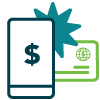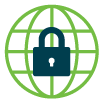October is Cybersecurity Month
Cybersecurity Awareness Month is an international campaign held every October to help the public learn more about the importance of cybersecurity. Cybersecurity is the protection against internet-connected cyber threats. These cyber attackers can interfere with systems like software, hardware, and data. Both individuals and companies should practice cybersecurity to ensure protection from external and unauthorized parties retrieving insider data.
To help you with what you need to know, we’ve compiled all sorts of important information to help you feel safe and protected from cyber threats while using online banking and other internet-connected systems.
⚠️ Warning: Avoid These Current Scams



Remote Deposit Capture Scams!
- Stay cautious and verify the source before depositing any checks remotely. Never share personal information and monitor your accounts regularly for any unauthorized activities. Educate yourself and stay informed about the common signs of scams and fraud tactics used by cybercriminals.
Romance Scams!
- Guard your heart and your funds, beware of romance scams! Be wary of online admirers who rush into financial requests or share suspicious stories. Always verify before trusting, and never send money to someone you haven’t met in person, and fully trust.
Tech Support Scams!
- Tech scammers use various tactics – from fake tech support calls to phishing emails – all designed to compromise your device and steal sensitive information.
- To protect yourself, it’s crucial to verify any unexpected tech support contact. Never share personal details unless you’re certain you know who you’re talking to. Additionally, keep your devices and software up-to-date to ensure they’re equipped to protect you.
Cybersecurity Basics to help protect yourself
Back up your files
Back up your files and systems offline. In a situation where your network is encrypted, you’ll have your files ready for restoring.
Stay on top of your emails
Do regular checks of your inbox and junk and delete what looks concerning. Pay close attention to documents that contain your date of birth or social insurance number. Set up an alert through your email or phone. You can get notifications for every transaction or transfer.
Review your browser
Review your browser, especially your permission settings. Be cautious of what programs you let access your location, passwords, and contact list. You should know why they need this information. Limiting the number of accounts with login access could stop an attacker before it’s too late.
Review your passwords
Make sure you have strong (and different) passwords between accounts and networks. If you find it challenging to keep up with multiple passwords, try using a password manager.
Enable two-step passwords whenever possible, especially for your online accounts.
Secure your home network
Your home wi-fi has access to your household phones, tablets, laptops, and more. If you don’t password protect your wi-fi, someone can quickly and easily get access to your networks, such as remote hackers or even your next-door neighbour. If you already have a password, you may want to practice regular changes to ensure it stays secure as possible.
Keep your social media private
Avoid sharing too much on social media. You can do this by keeping your profiles locked and deleting old content you no longer need.
Keep your banking information off social media. No matter the situation, even in messenger, you should never share your banking details with anyone.
Additional Cybersecurity Resources
Get Cyber Safe
Get Cyber Safe is a national public awareness campaign created to inform Canadians about cybersecurity and the simple steps they can take to protect themselves online.
Visit GetCyberSafe.ca
 Free Resources to Help Protect Your Digital Assets
Free Resources to Help Protect Your Digital Assets
Use these trusted online resources to help better protect yourself online.
Get started with your free resources here!


